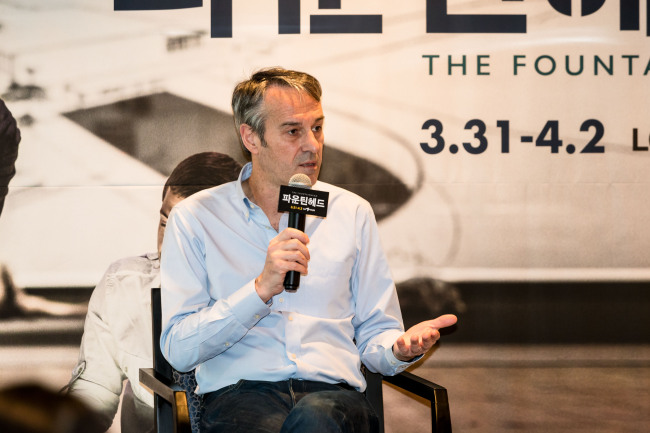Van Hove asks, ‘idealism or practicality?’ via ‘The Fountainhead’
By Yoon Min-sikPublished : March 30, 2017 - 16:21
To pursue what one believes in or to compromise is a question that ails nearly every soul, but this question can be even more pressing for someone walking down the path of art.
Such a dilemma is what Howard Roark -- protagonist of novel-turned-play “The Fountainhead” -- confronts as the young architect refusing to compromise his artistic and personal vision for worldly success.
According to Ivo van Hove, director of the acclaimed drama, this theme was the main motivation in producing a theatrical version of Ayn Rand’s 1943 novel of the same name.
Such a dilemma is what Howard Roark -- protagonist of novel-turned-play “The Fountainhead” -- confronts as the young architect refusing to compromise his artistic and personal vision for worldly success.
According to Ivo van Hove, director of the acclaimed drama, this theme was the main motivation in producing a theatrical version of Ayn Rand’s 1943 novel of the same name.

“It is a central issue for an artist. You always have to make a choice: do you want to follow your ideals or do you want to give the audience what you think they want. Author Ayn Rand confronts us with these sharply contrasting points of view,” van Hove said during a press conference held at LG Arts Center in Seoul on Thursday.
The Tony Award-winning director from Belgium came across Rand’s book in 2007, when his assistant gave it to him with the message “You have to read it now!”
Having devoured the 570-page book in a matter of days, he sought to put it on stage and the production saw light in 2014.
The story pits idealism and what can be viewed as collectivism through contrasting architects Roark and Peter Keating, a conformist clashing with ideals of Roark.
“Theatrically, this was a huge challenge, because I had to present a world of architects on stage,” van Hove said.
In order to create authenticity, the director had his actors draw designs as architects do. This allowed the characters to create a house -- albeit via only a drawing -- in front of the audience.
Theatrical adaptation of the book, however, had sparked criticism and controversy as it was considered one of the “bibles” of the far-right US movement known as the Tea Party.
Rand herself was a dispute-driven figure for her controversial stances on political and social issues.
But van Hove spoke against excluding an idea or a concept out of contempt for whom it had originated from.
“Just because she was not a nice person does not mean the ideas that she presents us with are not really important to think about,” he said, adding that one of the art’s functions is to provoke thinking.
Such ideas include Rand -- through Roark’s mouth -- questioning the concept of paying for the social welfare system in “The Fountainhead.”
“I think in the world of today, extreme liberal thinking is gaining more and more ground. And in this work, you’re presented with a choice between being part of a community or to be yourself...It’s the two deep issues that are the basis of this novel,” he said.
Van Hove’s work takes no sides. “I presented both possibilities,” he said.
“The Fountainhead,” produced by the Toneelgroep Amsterd, will be staged at LG Arts Center located in Yeoksam-dong, southern Seoul, from Friday to Sunday.
The drama is performed in Dutch and Korean subtitles will be provided. The four-hour play starts at 7:00 p.m. on Friday and 3:00 a.m. on Saturday and Sunday. It is rated suitable for an audience aged 19 and up due to the sexual content.
By Yoon Min-sik (minsikyoon@heraldcorp.com)











![[Today’s K-pop] BTS pop-up event to come to Seoul](http://res.heraldm.com/phpwas/restmb_idxmake.php?idx=644&simg=/content/image/2024/04/17/20240417050734_0.jpg&u=)





![[KH Explains] Hyundai's full hybrid edge to pay off amid slow transition to pure EVs](http://res.heraldm.com/phpwas/restmb_idxmake.php?idx=652&simg=/content/image/2024/04/18/20240418050645_0.jpg&u=20240419100350)

